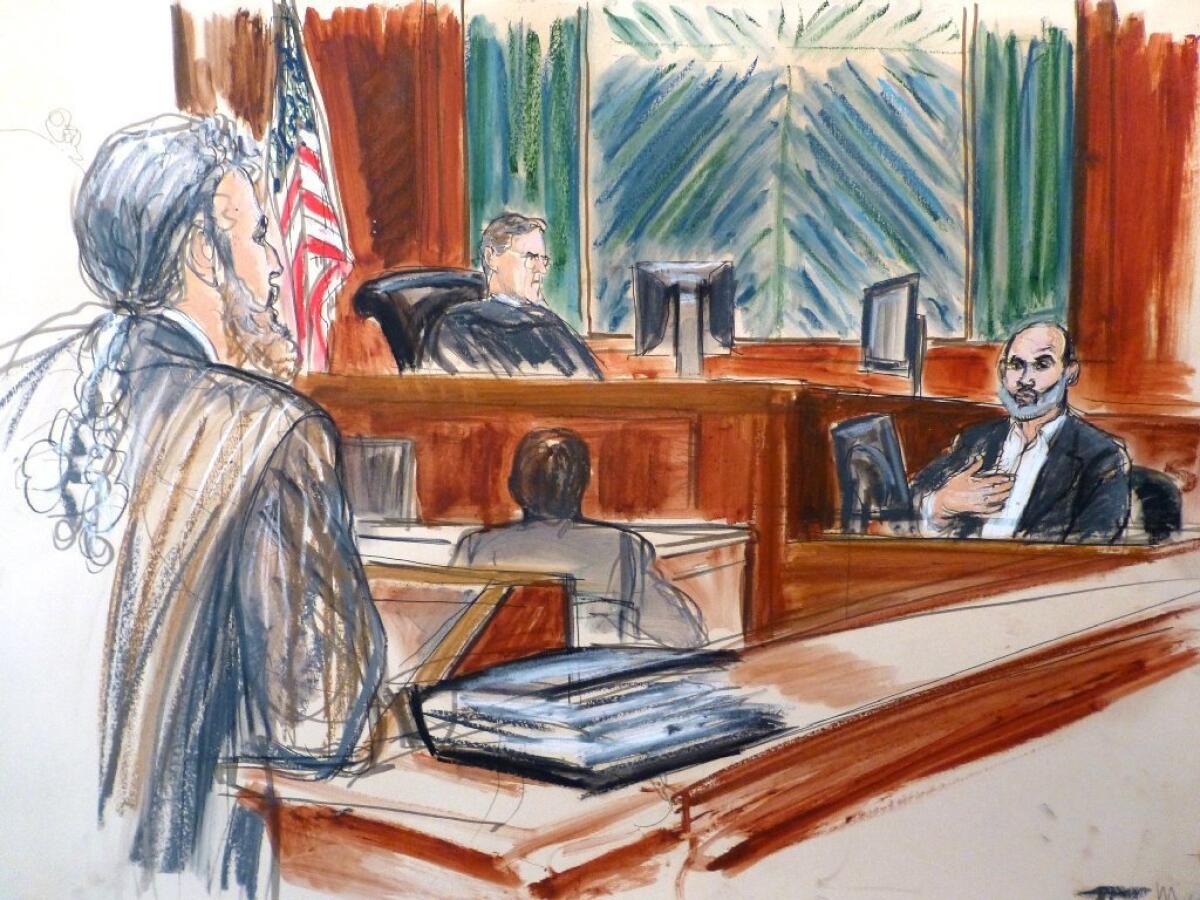Jury to begin deliberating fate of Bin Laden’s son-in-law

- Share via
NEW YORK - Jurors on Tuesday begin deliberating the fate of a former Al Qaeda spokesman portrayed by lawyers as either a hardened terrorist buoyed by the Sept. 11, 2001, attacks or an innocent cleric accidentally drawn into Osama bin Laden’s orbit.
The case of Sulaiman abu Ghaith, a son-in-law of Bin Laden, has given the public its first and possibly only chance to watch a terrorism trial related to the 2001 attacks unfold in civilian court. Unlike other high-profile terrorism suspects accused of crimes arising from the attacks, Abu Ghaith bypassed the U.S. military prison in Guantanamo Bay, Cuba, after his arrest last year.
Instead, he was brought directly to New York, where his trial began March 5 just blocks from where the World Trade Center towers once stood. The U.S. attorney for the southern district of New York, Preet Bharara, was among the spectators who packed the room Monday as Jonathan Cronan delivered the prosecution’s closing statement.
“This man was not Osama bin Laden’s puppet,” said Cronan, an assistant U.S. attorney, as he pointed his finger at Abu Ghaith. “He was not a robot.”
Instead, Cronan said, Abu Ghaith was a high-ranking Al Qaeda leader who was summoned to Bin Laden’s cave in the mountains outside Kabul, Afghanistan, on the evening of Sept. 11, 2001. There, Abu Ghaith was asked to deliver a rousing speech heralding the killings and urging young Muslims to stage more attacks, Cronan said.
“Al Qaeda’s purpose was to murder Americans, and the defendant was all in,” Cronan said as Abu Ghaith listened through an English to Arabic interpreter.
Abu Ghaith’s defense attorney, Stanley Cohen, dismissed the government’s case as based not on evidence but on recordings and videos, including one showing hijacked jets slamming into the World Trade Center towers and the buildings enveloped in black smoke.
“It was intended to sweep you away ... in anguish and pain,” said Cohen, comparing the prosecution’s case to a movie.
“The movie’s over, the lights are back on, and we’ve walked out of the theater. Let’s look at the evidence,” he said, before dismissing the government’s allegations as “speculation” and its witnesses as liars or frauds.
“He lies and lies and lies and lies,” Cohen said of Sahim Alwan, who testified that he saw Abu Ghaith in Afghanistan in spring 2001 discussing with Al Qaeda recruits the idea of pledging “bayat,” or loyalty, to Bin Laden.
“He sits at a computer and he looks and he looks and he looks and he looks,” Cohen said of Evan Coleman, a prosecution witness who was described as a terrorism expert, and who testified that Abu Ghaith’s speeches were recruiting tools for Al Qaeda.
When he testified in his own defense Wednesday, Abu Ghaith said his speeches were based on talking points fed to him by Bin Laden and that he delivered them on behalf of Muslims in general, not Al Qaeda.
In a sharply worded rebuttal, prosecutor Michael Ferrara said the government’s case was “absolutely overwhelming.”
“This man was literally the face of Al Qaeda. He was the voice of Al Qaeda,” Ferrara said.
Abu Ghaith, 48, could face life in prison if convicted of conspiring to kill Americans; conspiring to provide material support or resources to Al Qaeda; and providing material support or resources to Al Qaeda.
Key to the prosecution’s case were videos produced in the days after Sept. 11, including one on Sept. 12 that showed Abu Ghaith railing against the United States, praising the attacks and urging more strikes.
Abu Ghaith is not accused of planning or taking part in the 2001 hijackings, but the government says his role as Al Qaeda’s spokesman ensured the terrorist group a steady supply of suicide bombers eager to take part in jihad.
An acquittal would prove deeply embarrassing to the Obama administration, which has argued that civilian courts are a better place to handle high-profile terrorism suspects than the military prison in Guantanamo Bay. A conviction would show that justice can be meted out far more rapidly than in Guantanamo, where about 75 detainees are being held indefinitely as “enemy combatants.”
They include the self-proclaimed mastermind of the Sept. 11 attacks, Khalid Shaikh Mohammed, and four codefendants who have been in custody for 11 years with no trial in sight.
Follow LA Times National on Facebook
ALSO:
Mudslide toll reaches 14 as 6 more bodies are found
Zion National Park finds body of missing BASE jumper
Texas oil spill harms wildlife; shipping channel remains closed
More to Read
Sign up for Essential California
The most important California stories and recommendations in your inbox every morning.
You may occasionally receive promotional content from the Los Angeles Times.











